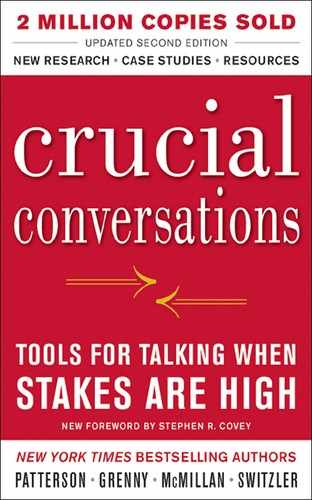MAINTAIN SAFETY
In order to speak honestly when honesty could easily offend others, we have to find a way to maintain safety. That’s a bit like telling someone to smash another person in the nose, but, you know, don’t hurt him. How can we speak the unspeakable and still maintain respect? Actually, it can be done if you know how to carefully blend three ingredients—confidence, humility, and skill.
Confidence. Most people simply won’t hold delicate conversations—well, at least not with the right person. For instance, your colleague Brian goes home at night and tells his wife that his boss, Fernando, is micromanaging him to within an inch of his life. He says the same thing over lunch when talking with his pals. Everyone knows what Brian thinks about Fernando—except, of course, Fernando.
People who are skilled at dialogue have the confidence to say what needs to be said to the person who needs to hear it. They are confident that their opinions deserve to be placed in the pool of meaning. They are also confident that they can speak openly without brutalizing others or causing undue offense.
Humility. Confidence does not equate to arrogance or pigheadedness. Skilled people are confident that they have something to say, but also realize that others have valuable input. They are humble enough to realize that they don’t have a monopoly on the truth nor do they always have to win their way. Their opinions provide a starting point but not the final word. They may currently believe something but realize that with new information they may change their minds. This means they’re willing to both express their opinions and encourage others to do the same.
Skill. Finally, people who willingly share delicate information are good at doing it. That’s why they’re confident in the first place. They don’t make a Fool’s Choice, because they’ve found a path that allows for both candor and safety. They speak the unspeakable, and people are grateful for their honesty.
Good Night and Good-Bye!
To see how to discuss sensitive issues, let’s look at an enormously difficult problem. Bob has just walked in the door, and his wife, Carole, looks upset. He can tell from her swollen eyes that she’s been crying. Only when he walks in the door, Carole doesn’t turn to him for comfort. Instead, she looks at him with an expression that says, “How could you?” Bob doesn’t know it yet, but Carole thinks he’s having an affair. He’s not.
How did Carole come to this dangerous and wrong conclusion? Earlier that day she had been going over the credit card statement when she noticed a charge from the Good Night Motel—a cheap place located not more than a mile from their home. “Why would he stay in a motel so close to home?” she wonders. “And why didn’t I know about it?” Then it hits her—“That unfaithful jerk!”
Now what’s the worst way Carole might handle this (one that doesn’t involve packing up and moving back to Australia)? What’s the worst way of talking about the problem? Most people agree that jumping in with an ugly accusation followed by a threat is a good candidate for that distinction. It’s also what most people do, and Carole is no exception.
“I can’t believe you’re doing this to me,” she says in a painful tone.
“Doing what?” Bob asks—not knowing what she’s talking about, but figuring that whatever it is, it can’t be good.
“You know what I’m talking about,” she says, continuing to keep Bob on edge.
“Do I need to apologize for missing her birthday?” Bob wonders to himself. “No, it’s not even summer and her birthday is on . . . well, it’s sweltering on her birthday.”
“I’m sorry, I don’t know what you’re talking about,” he responds, taken aback.
“You’re having an affair, and I have proof right here!” Carole explains holding up a piece of crumpled paper.
“What’s on that paper that says I’m having an affair?” he asks, completely befuddled because (1) he’s not having an affair, and (2) the paper contains not a single compromising photo.
“It’s a motel bill, you jerk. You take some woman to a motel, and you put it on the credit card?! I can’t believe you’re doing this to me!”
Now if Carole were certain that Bob was having an affair, perhaps this kind of talk would be warranted. It may not be the best way to work through the issue, but Bob would at least understand why Carole made the accusations and hurled threats.
But, in truth, she only has a piece of paper with some numbers on it. This tangible piece of evidence has made her suspicious. How should she talk about this nasty hunch in a way that leads to dialogue?
